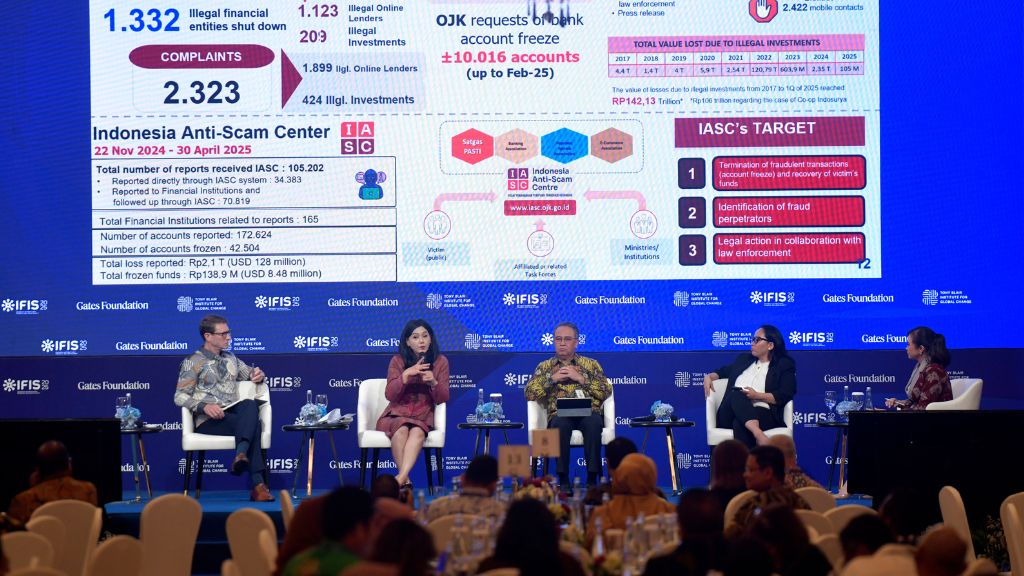Tackling last mile gaps in Indonesia’s financial inclusion journey
By Mochamad Azhar
Public sector leaders and non-profit organisations highlighted two main challenges in Indonesia's financial inclusion: Ensuring the security of financial transactions and reaching vulnerable and underserved groups.

Panelists from the public sector and non-profit highlighted the security of digital transactions as a key aspect of financial inclusion. Image: TBI
Indonesia's financial inclusion has seen a positive trend in the past five years, with 76.3 per cent of the population now holding accounts with formal financial institutions and 88.7 per cent using formal financial services, according to a report by Bank Indonesia (BI).
For an inclusive financial system, the Quick Response Code Indonesian Standard (QRIS) now underpins Indonesia's digital payment system, making cashless transactions universally accessible.
Bank Indonesia’s Head of Payment System Policy Department, Dicky Kartikoyono, said that QRIS was designed to be inclusive for everyone, not just for middle-to-upper-class or urban communities.
"Small businesses like 'tukang bakso' [meatball soup stall] or any other food hawkers have taken advantage of QRIS to accept payments simply by having a banking app and sticking a QR code sticker on their carts," he noted.
Kartikoyono was speaking at a panel titled Reimagining Financial Inclusion: From Present Challenges to Future Opportunities at Indonesia International Financial Inclusion Summit (IFIS) 2025 in Jakarta recently.
IFIS 2025 was organised by the Tony Blair Institute for Global Change (TBI) and the Gates Foundation in collaboration with Indonesia’s Coordinating Ministry for Economic Affairs, BI, and the Financial Services Authority (OJK).
According to Kartikoyono, QRIS has recorded an average transaction growth of over 150 per cent annually over the past five years, with transaction value reaching IDR658 trillion (S$51,75 billion) from 65 billion transactions.
“The fraud is about one per cent, a relatively low figure on a national scale,” he added.
Other panel speakers were Gates Foundation’s Indonesia Lead for DPI and Inclusive Financial Systems, Brooke Patterson; OJK’s Chief Executive of Market Conduct, Supervision, Financial Education, and Consumer Protection, Friderica Widyasari; and TBI’s Indonesia Director, Shuhaela Haqim. The panel was moderated by SEAToday’s journalist, Sara Wayne.
To subscribe to the GovInsider bulletin, click here.
Ensuring security of the digital transaction
Gates Foundation's Patterson noted that while Indonesia has seen low digital payment fraud, criminals would inevitably adapt to new technologies.
Therefore, it is important for the government to secure their systems against cybercriminals who were looking to commit scams through instant payment systems.
"People will only continue to use financial services if they feel the system is trustworthy," he said.
Patterson emphasised the need to balance easy access, system security, and consumer protection, which can be provided through biometric-based digital IDs.
"Service providers and also the government, must be able to ensure that the individual transacting is actually who they are," he added.
Patterson highlighted that women, people with disabilities, and residents in remote areas remain the most underserved groups. He particularly stressed that women, who constitute half the population, often have their specific financial needs overlooked.
To address their needs, the first thing to do is to ensure that basic infrastructure such as digital payment systems, digital IDs, and connectivity is available and functioning evenly across the region, he said.
Next, targeted programmes such as food assistance must be integrated with digital banking to expand financial inclusion and increase efficiency.
Protecting the vulnerable and underserved
OJK's Widyasari highlighted that consumer protection and financial inclusion efforts often intersect with vulnerable and underserved groups.
"Women – who play a vital role in managing family finances – are often trapped in illegal loans due to limited access to formal financial services.
“Meanwhile, many informal sector workers, farmers, and fishermen have not well received financial literacy education," she said.
She shared her institution’s comprehensive and collaborative approach to strengthening consumer protection and ensuring financial inclusion for all segments of society.
With the new Law on the Development and Strengthening of the Financial Sector (UU P2SK) in 2024, the OJK has strengthened three key aspects of consumer protection: market conduct supervision, complaint handling, and eradicating illegal financial activities.
This regulation has led to the formation of OJK's Satgas PASTI (Task Force for Handling Illegal Financial Activities) and the establishment of the Indonesia Anti-Scam Centre in November 2024.
Widyasari also stated that this regulation also mandates financial institutions to collaborate with OJK in educating consumers, viewing it as a shared responsibility.
“If you open a digital service, you must also accompany your customers. Educate them, walk with them," she urged.
Through the National Movement for Financial Literacy and Inclusion, OJK gathered all financial entities operating in Indonesia (around 2,500 institutions) to create nationwide public education programmes.
"We do not want literacy activities to be centred only in Jakarta. Papua, Maluku, Kalimantan, all regions must be covered," she added.
Building an integrated digital ID
TBI's Haqim highlighted that Indonesia faces a huge task in building a truly integrated digital ID. However, this task would certainly require a significant budget.
"I encourage the government to place its trust in the enormous potential of digital ID, as India and Singapore have done, which are currently reaping the economic benefits of DPI," she said.
Haqim also stated that the collaborative efforts to develop the foundation of the digital ID system by Dukcapil, and government’s plan on developing digital public infrastructure (DPI) was already on the right track.
However, implementation and execution were the most important aspects.
"We already have stakeholders; we already have the system. All that's left is to consistently implement the policies that have been established," she noted.